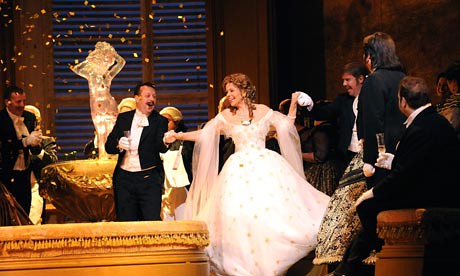
(Renée Fleming, ossia Violetta Valéry - La Traviata: Covent Garden, Londres, Junho de 2009)
«Renée Fleming is in complete command as Verdi's courtesan, facing down the awesome difficulties of her big first act solo scene with assurance and maintaining a strong tone inflected with appropriate colours. Dramatically, she is never short of initiative, occasionally of a stagey kind but more often delivered with a sense of conviction that goes to the heart of Violetta's emotional truth. In previous revivals, Joseph Calleja's Alfredo proved the complete vocalist but an indifferent actor. Here, in his newfound engagement with the character of Violetta's young lover, he takes several steps forward. Formerly stiff, he now presents an ideal combination of the vulnerable and the headstrong; when he hurls his winnings at Violetta in the gambling scene, his violence is genuinely shocking. Thomas Hampson's Germont retains some stock gestures when his arms take on a life of their own. But much of his performance is dramatically thought-through, and his singing is consistently empowered. Germont's big second-act aria, Di Provenza, can seem anticlimactic; here it is a genuine emotional highlight. Music director Antonio Pappano takes charge of this revival, searching out the meaning of Verdi's score in a supple, sentient reading that sweeps you along.»
Se dúvidas houvesse, quanto às qualidades interpretativas do trio & maestro...
«Renée Fleming is in complete command as Verdi's courtesan, facing down the awesome difficulties of her big first act solo scene with assurance and maintaining a strong tone inflected with appropriate colours. Dramatically, she is never short of initiative, occasionally of a stagey kind but more often delivered with a sense of conviction that goes to the heart of Violetta's emotional truth. In previous revivals, Joseph Calleja's Alfredo proved the complete vocalist but an indifferent actor. Here, in his newfound engagement with the character of Violetta's young lover, he takes several steps forward. Formerly stiff, he now presents an ideal combination of the vulnerable and the headstrong; when he hurls his winnings at Violetta in the gambling scene, his violence is genuinely shocking. Thomas Hampson's Germont retains some stock gestures when his arms take on a life of their own. But much of his performance is dramatically thought-through, and his singing is consistently empowered. Germont's big second-act aria, Di Provenza, can seem anticlimactic; here it is a genuine emotional highlight. Music director Antonio Pappano takes charge of this revival, searching out the meaning of Verdi's score in a supple, sentient reading that sweeps you along.»
Se dúvidas houvesse, quanto às qualidades interpretativas do trio & maestro...
Caro João,
ResponderEliminarSem que tenha nada que ver com o tópico, pergunto-lhe: que me diz do Don Giovanni, creio que de 1970, dirigido por Carlo Maria Giulini, com Ghiaurov no papel titular?
Cumprimentos,
Luís Froes
Caro Luís,
ResponderEliminarÉ apenas mais um Don, nada tendo que ver com o primeiro de Giulini. Tirando Ghiaurov, Janowitz e o magnífico Kraus, é pouco mais que banal...
Hum...não sei se estou aboslutamente de acordo consigo, mas, como é um verdadeiro especialista na matéria, tenho a sua opinião em conta. Sabe, foi o primeiro Don que ouvi, daí ter-lhe um certo amor. Depois disso, e como sou grande apreciador de Von Karajan, cai na asneira de comprar a sua leitura de Salzburgo, em DVD, tudo menos mozartiana, a meu ver.
ResponderEliminarE, já agora, o que me diz da Flauta Mágica dirigida por Sawallisch em Munique, com Popp, Gruberova, Brendel...?
Já agora, e porque prezo as suas opiniões (sou um leitor assíduo do seu blog já há algum tempo, apesar de só agora me manifestar), pergunto-lhe o que acha, em traços muito gerais, das leituras de Solti no terreno operático mozartiano (as suas Nozze, que adoro!, e as duas Zauberflöte's que gravou), bem como das interpretações a cabo de Haitink - o seu Don, a sua Zauberflöte e a sua Così.
ResponderEliminarSe tiver paciência para me responder, ficarei agradecido!
Luís,
ResponderEliminarO Don Giovanni de Von Karajan, de Salzburgo... Presumo que esteja a falar do dos anos 1980... que é uma tragédia, a que já fiz referência inúmeras vezes, neste blog. Em todo o caso, experimente o protagonizado pelo mesmo Ghiaurov, de início dos anos 1970. Este último é outra coisa ;-)
Caro Luís,
ResponderEliminarMozart e Solti não funciona... salvo o Le Nozze, que é superlativo! A A Flauta Mágica, não é brilhante, apesar da bela A Rainha de Jo.
Já Haitink... é outra coisa! O seu Don é do melhorio - também já o comentei neste blog -, com um protagonista nobre (Allen). Não conheço bem o Così de Haitink; quanto às suas Le Nozze, brilham pela A Condessa de Fleming, novinha e de um brilho superlativo.
O primeiro Don que ouvi foi o de Ghiaurov (Giulini), depois o de Siepi (Furtwäengler), que achei delicioso, e, por fim, cai na asneira de pegar no de Ramey (Karajan), que mais parece um drama pucciniano...
ResponderEliminarE a Flauta Mágica de Sawallisch com Popp, Gruberova, Brendel, Moll, etc.?
ResponderEliminarLuís,
ResponderEliminarSiepi foi o melhor Don de sempre, eventualmente ladeado por Hampson e Terfel, além de Allen.
Experimente o Don do mesmo Siepi, via Krips ou Mitroupolus e depois diga-me!
A Flauta é uma peça mozartiana que não me fascina. Não conheço a leitura de Sawallisch, mas a Rainha da Popp é um assombro - tal como a sua Pamina!